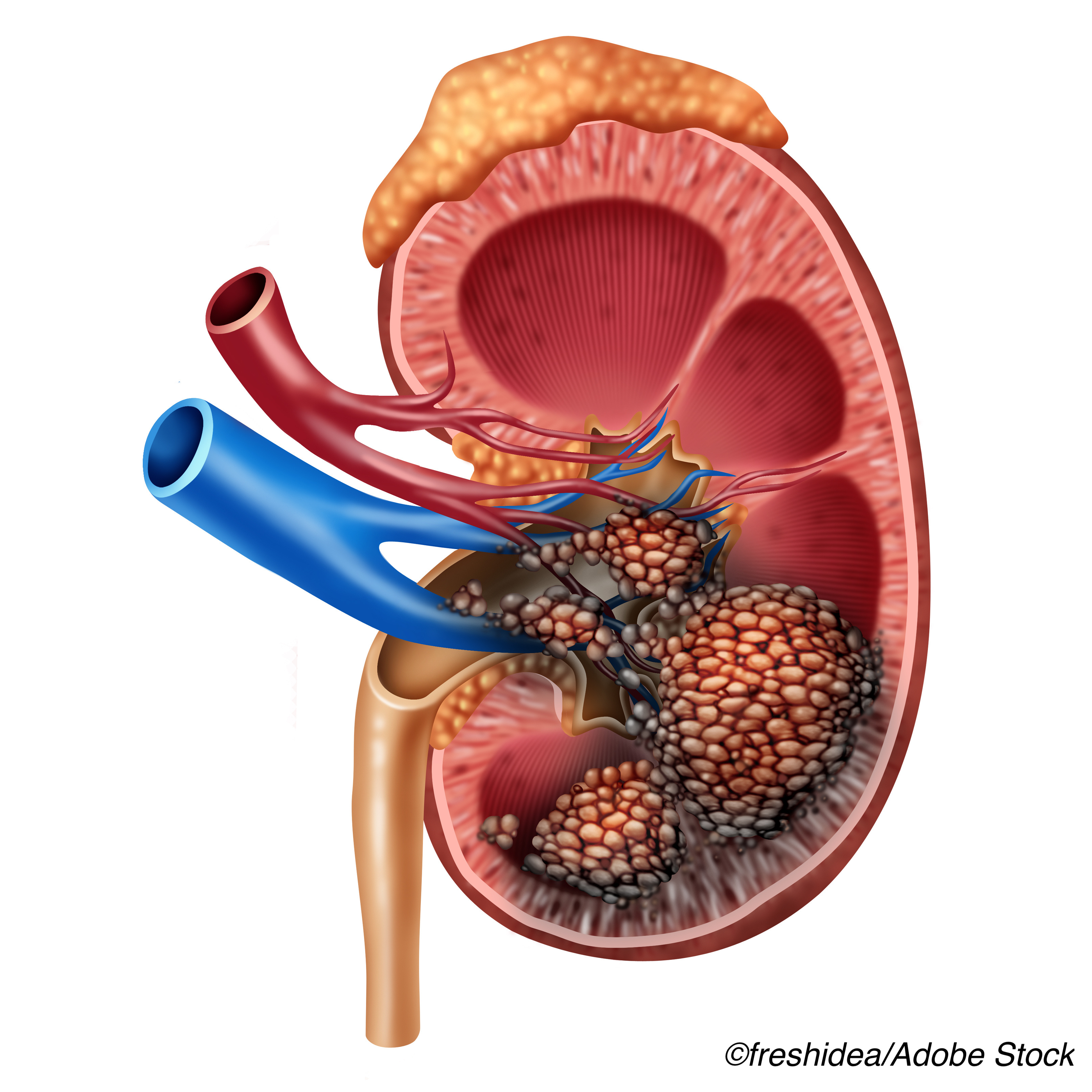
Combination treatment with nivolumab plus cabozantinib in patients with treatment-naïve advanced renal-cell carcinoma (RCC) brings about significantly increased progression-free survival (PFS), overall survival (OS), and the likelihood of response compared with sunitinib, according to results from the CheckMate 9ER clinical trial, published in The New England Journal of Medicine.
Both nivolumab and cabozantinib—a programmed death 1 (PD-1) immune checkpoint inhibitor antibody and a small-molecule inhibitor of tyrosine kinases, respectively — are approved for the treatment of advanced renal-cell carcinoma. Used separately, both drugs have been shown to improve overall survival.
In January 2021, the FDA approved the use of this combination as first-line treatment for patients with advanced renal cell carcinoma (RCC) based, in part, on efficacy results from the Checkmate 9ER study.
Checkmate 9ER investigators, led by Toni K. Choueiri, MD, of the Dana-Farber Cancer Institute, Brigham and Women’s Hospital and Harvard Medical School, Boston, sought to compare the efficacy and safety of the combination of these drugs against sunitinib as first-line treatment for patients with advanced RCC with clear-cell histologic features.
“First-line immunotherapy-based regimens have transformed the treatment landscape for advanced renal-cell carcinoma, providing significant improvements in clinical outcomes, including overall survival,” they wrote.
For the phase III, randomized, open-label CheckMate 9ER trial, Choueiri and colleagues randomized 651 patients with treatment-naïve clear-cell, advanced renal-cell carcinoma to treatment with either nivolumab (240 mg every 2 weeks) plus cabozantinib (40 mg once daily) or sunitinib (50 mg once daily for 4 weeks of each 6-week cycle). PFS was the study’s primary endpoint, and OS, objective response (OR), and safety were secondary endpoints.
Median patient age was 62 years in the nivolumab/cabozantinib group and 61 years in the sunitinib group. The majority of patients in both groups were men (77% and 70.7%, respectively), and 68.7% and 71.0% had undergone previous nephrectomy.
The most common sites of metastasis in both groups were the lung (73.7% and 75.9%), lymph node (40.2% and 39.9%), and bone (24.1% and 22.0%). Most patients had no sarcomatoid features, and roughly 74% of patients in both groups had tumor PD-L1 expression less than 1%.
After a median follow-up of 18.1 months, the risk of disease progression or death was 49% lower in patients treated with nivolumab plus cabozantinib, and median PFS was twice as long compared with that in patients treated with sunitinib:
- PFS: 16.6 versus 8.3 months, respectively (HR: 0.51; 95% CI: 0.41-0.64; P<0.001).
- OS at 12 months: 85.7% versus 75.6% (HR for death: 0.60; 98.89% CI: 0.40-0.89; P=0.001).
- OR: 55.7% versus 27.1% (P<0.001).
- Median time to response: 2.8 versus 4.2 months.
- Median duration of response: 20.2 versus 11.5 months.
- Complete response: 8.0% versus 4.6%.
The probability of an ongoing response at 12 months was 71.1% with nivolumab plus cabozantinib and 40.9% with sunitinib. Among patients with evaluable data treated with nivolumab plus cabozantinib (n=284), 94.7% had any reduction in the sum of target-lesion diameters, and 70.4% had a reduction of at least 30%. Among evaluable patients in the sunitinib group (n=259), 84.9% had any reduction, and 42.5% had reductions of at least 30%.
Adverse events of grade 3 or higher occurred more frequently in more patients treated with nivolumab plus cabozantinib compared with sunitinib (75.3% vs 70.6%, respectively) — 19.7% of patients treated with the combination therapy discontinued at least one drug due to adverse events, and 5.6% discontinued both.
“The combination was associated with substantial toxic effects… nevertheless, quality of life was maintained at a high level,” noted Choueiri and colleagues, adding that while the adverse-event profile of nivolumab plus cabozantinib was “not trivial,” it was consistent with what was seen in previous studies when each was used as monotherapy.
Patients treated with nivolumab plus cabozantinib, however, reported having better health-related quality of life compared with those treated with sunitinib. In addition, quality of life was maintained over time with nivolumab plus cabozantinib but consistently deteriorated from baseline in patients treated with sunitinib.
“In this trial involving patients with previously untreated advanced renal-cell carcinoma, nivolumab plus cabozantinib had significant benefits over sunitinib with respect to progression-free survival, overall survival, and the likelihood of objective response,” concluded Choueiri et al.
Study limitations include the short follow-up, the lack of blinding, and missing assessments of tumor response, which are ongoing to determine longer-term outcomes.
-
Nivolumab plus cabozantinib had significant benefits over sunitinib in progression-free survival, overall survival, and likelihood of response in patients with previously untreated advanced renal-cell carcinoma.
-
Combination treatment with nivolumab plus cabozantinib was associated with substantial toxicity, but patients maintained their quality of life at a high level.
Liz Meszaros, Contributing Writer, BreakingMED™
Supported by Bristol Myers Squibb in collaboration with Ono Pharmaceutical and with Exelixis, Ipsen Pharma, and Takeda Pharmaceutical.
Choueiri is supported in part by the Dana–Farber/Harvard Cancer Center Kidney Specialized Program of Research Excellence, the Kohlberg Chair at Harvard Medical School, the Trust Family, Michael Brigham, and Loker Pinard Funds for Kidney Cancer Research at Dana–Farber Cancer Institute and by various grants from the National Cancer Institute, Department of Defense, and foundations.
Cat ID: 835
Topic ID: 78,835,730,835,935,127,192,925


